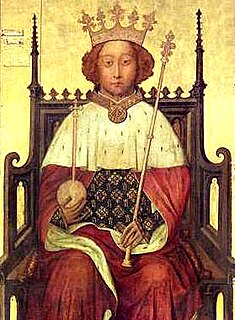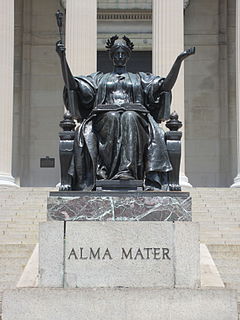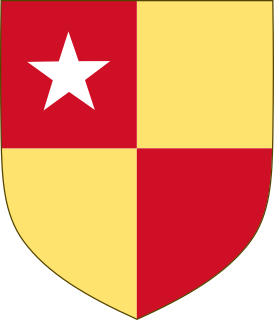Related Research Articles

Geoffrey Chaucer was an English poet and author. Widely considered the greatest English poet of the Middle Ages, he is best known for The Canterbury Tales. He has been called the "father of English literature", or, alternatively, the "father of English poetry". He was the first writer to be buried in what has since come to be called Poets' Corner, in Westminster Abbey. Chaucer also gained fame as a philosopher and astronomer, composing the scientific A Treatise on the Astrolabe for his 10-year-old son Lewis. He maintained a career in the civil service as a bureaucrat, courtier, diplomat, and member of parliament.

Richard I was King of England from 1189 until his death in 1199. He also ruled as Duke of Normandy, Aquitaine and Gascony, Lord of Cyprus, and Count of Poitiers, Anjou, Maine, and Nantes, and was overlord of Brittany at various times during the same period. He was the third of five sons of King Henry II of England and Eleanor of Aquitaine and seemed unlikely to become king, but all his brothers except the youngest, John, predeceased their father. Richard is known as Richard Cœur de Lion or Richard the Lionheart because of his reputation as a great military leader and warrior. The troubadour Bertran de Born also called him Richard Oc-e-Non, possibly from a reputation for terseness.

Richard II, also known as Richard of Bordeaux, was King of England from 1377 until he was deposed in 1399. Richard's father, Edward, Prince of Wales, died in 1376, leaving Richard as heir apparent to his grandfather, King Edward III. Upon the death of Edward III, the 10-year-old Richard succeeded to the throne.

Henry III, also known as Henry of Winchester, was King of England, Lord of Ireland, and Duke of Aquitaine from 1216 until his death in 1272. The son of King John and Isabella of Angoulême, Henry assumed the throne when he was only nine in the middle of the First Barons' War. Cardinal Guala declared the war against the rebel barons to be a religious crusade and Henry's forces, led by William Marshal, defeated the rebels at the battles of Lincoln and Sandwich in 1217. Henry promised to abide by the Great Charter of 1225, a later version of the 1215 Magna Carta, which limited royal power and protected the rights of the major barons. His early rule was dominated first by Hubert de Burgh and then Peter des Roches, who re-established royal authority after the war. In 1230, the King attempted to reconquer the provinces of France that had once belonged to his father, but the invasion was a debacle. A revolt led by William Marshal's son, Richard Marshal, broke out in 1232, ending in a peace settlement negotiated by the Church.

Henry IV or Henry Bolingbroke was King of England from 1399 to 1413. He asserted the claim of his grandfather King Edward III, a maternal grandson of Philip IV of France, to the Kingdom of France. Henry was the first English ruler since the Norman Conquest, over three hundred years prior, whose mother tongue was English rather than French.

Richard of Conisbrough, 3rd Earl of Cambridge was the second son of Edmund of Langley, 1st Duke of York, and Isabella of Castile, Duchess of York. He was beheaded for his part in the Southampton Plot, a conspiracy against King Henry V. He was the father of Richard Plantagenet, 3rd Duke of York, and the grandfather of King Edward IV and King Richard III.

Alma mater is an allegorical Latin phrase currently used to identify a school, college, or university that one formerly attended. The phrase is variously translated as "nourishing mother", "nursing mother", or "fostering mother", suggesting that a school provides intellectual nourishment to her students.

Earl of Oxford is a dormant title in the Peerage of England, first created for Aubrey de Vere by the Empress Matilda in 1141. His family was to hold the title for more than five and a half centuries, until the death of the 20th Earl in 1703. The de Veres were also hereditary holders of the office of Master Chamberlain of England from 1133 until the death of the 18th Earl in 1625. Their primary seat was Hedingham Castle in Essex, but they held lands in southern England and the Midlands, particularly in eastern England. The actual earldom was called 'Oxenford' until at least the end of the 17th century. Medieval sources thus refer to 'my lord of Oxenford' when speaking of the earl.

Richard Poore or Poor was a medieval English bishop best known for his role in the establishment of Salisbury Cathedral and the City of Salisbury, moved from the nearby fortress of Old Sarum. He served as Bishop of Chichester, Bishop of Salisbury and Bishop of Durham.

Richard Rolle was an English hermit, mystic, and religious writer. He is also known as Richard Rolle of Hampole or de Hampole, since at the end of his life he lived near a Cistercian nunnery in Hampole, now in South Yorkshire. In the words of Nicholas Watson, scholarly research has shown that "[d]uring the fifteenth century he was one of the most widely read of English writers, whose works survive in nearly four hundred English ... and at least seventy Continental manuscripts, almost all written between 1390 and 1500."

The House of Burgh, de Burgh, Burke or Bourke was an ancient Anglo-Norman and later Hiberno-Norman aristocratic dynasty with the Anglo-Irish branches later adopting the surname Burke and its variants.

The House of Plantagenet was a royal house which originated from the lands of Anjou in France. The family held the English throne from 1154 to 1485, when Richard III died in battle.

Cancer (♋︎) is the fourth astrological sign in the zodiac, originating from the constellation of Cancer. It spans from 90° to 120° celestial longitude. Under the tropical zodiac, the Sun transits this area between approximately June 22 and July 22, and under the sidereal zodiac, the Sun transits this area between approximately July 16 and August 17.
Richard Courtenay was an English prelate and university chancellor, who served as Bishop of Norwich 1413-15.
Events from the year 1130 in Ireland.
Events from the year 1318 in Ireland.
Richard de Capella or Richard of the Chapel was a medieval Bishop of Hereford.
Richard of Gravesend was a medieval Bishop of Lincoln.
Events from the 1260s in England.
References
- Ashworth, E. J. "Feribrigge, Richard". Oxford Dictionary of National Biography (online ed.). Oxford University Press. doi:10.1093/ref:odnb/53184.(Subscription or UK public library membership required.)